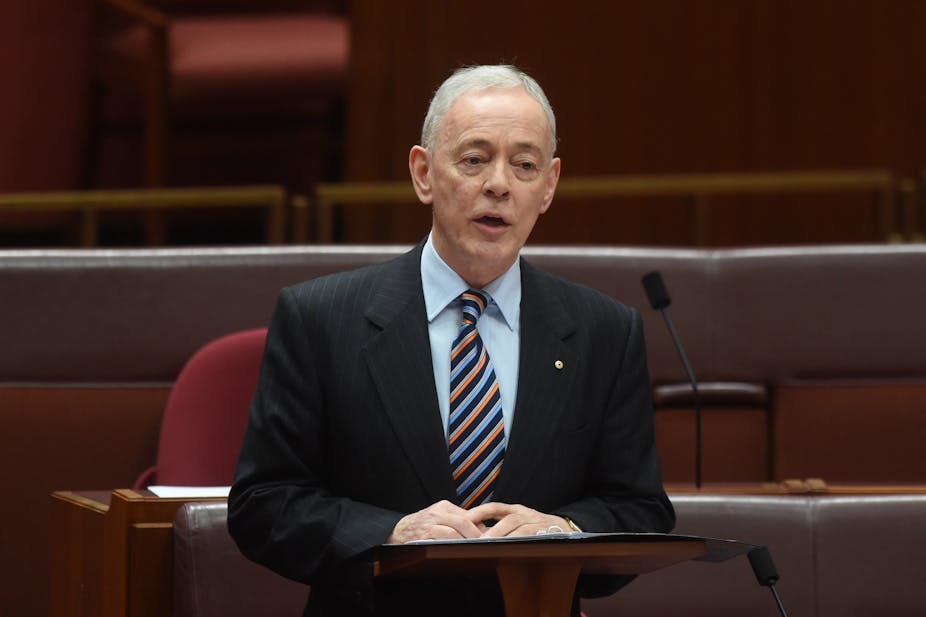Early in 2014, federal Attorney-General George Brandis released a proposal to significantly amend our law against racial vilification, Sections 18C and 18D of the Racial Discrimination Act, on the strength, it seems, of a promise to Andrew Bolt. After widespread condemnation the proposal was abandoned. No bill was ever tabled in parliament.
The proposal was a radical watering down of the protection against racial vilification. It would have shifted the “free speech” balance so far that almost anything could be said with impunity.
There is now a second proposal to amend Section 18C, although both Prime Minister Tony Abbott and Nationals leader Warren Truss have said it will not have the government’s support.
In September 2014, Family First senator Bob Day tabled a bill in parliament on behalf of himself, Liberal Democrat senator David Leyonhjelm and Liberal senators Cory Bernardi and Dean Smith. The bill, as media columnist Jonathan Holmes has said, is much simpler than Brandis’ proposals. It makes a small but important change to the current law.
The bill would not change the way that the protection in Section 18C operates, nor would it change the “free speech” exceptions in Section 18D. What it would do is raise the bar as to what constitutes unlawful vilification.
Subject to the “free speech” exceptions, it is currently unlawful to do something that is reasonably likely to “offend, insult, humiliate or intimidate” a person if the conduct is done because of a person’s race, colour or national or ethnic origin. Day’s bill would drop the words “offend” and “insult”.
This wouldn’t have made a difference to the case of Bolt, a News Corp columnist. The Federal Court found that his conduct caused Aboriginal people to feel humiliated, and in one case intimidated, as well as offended and insulted.
But it would make a difference to people who, every day, must grin and bear it when they are subjected to the casual racism in Australia that Race Discrimination Commissioner Tim Soutphommasane has identified.
Law has symbolic power. It sends a message to the public, from elected leaders, about what is acceptable conduct in society. The clear effect of Day’s bill would be to signal that it is permissible to engage in race-based conduct that causes offence and insult. Such a change is proposed in the name of “free speech”. However, nothing about Australia’s current laws and the way they operate warrants such a change.
Truss is correct to say that race-hate laws don’t need to be changed for people to speak their minds about issues they feel are important. Abbott is correct to say that that we do have very robust free speech in this country. The limits that Sections 18C and 18D impose on vilifying conduct are modest and – but for Bolt’s transgression – unremarkable.
The Charlie Hebdo context
Day’s bill has been public, with little comment, since September last year, and now seems unlikely to progress in light of Abbott and Truss’ comments. But it is in the headlines because of a spurious connection with the Charlie Hebdo attack in France.
The connection is spurious because, as Truss said, what happened in Paris had nothing to do with race issues. Murderous conduct is no measure of how far a society ought to go in allowing or limiting the expression of views on race.
Much of the commentary on free speech that was promoted by the Charlie Hebdo killings is quite simply wrong, and confuses any debate about racial vilification in Australia.
Human Rights Commissioner Tim Wilson has said that:
There is no ambiguity that Charlie Hebdo would be censored in Australia.
I am not sure what this means, but an implication that the Charlie Hebdo cartoons would be caught by the Racial Discrimination Act is misleading.
Consider a cartoon about Islam. A complaint of religious vilification could not be made, because there is no federal law against it. No racial discrimination complaint could be made, because the law in Australia is that Islam does not equate with race. That’s it: free speech, unambiguously unconstrained by the Racial Discrimination Act.
Charlie Hebdo does do cartoons about race, and so do Australian publications. A racial vilification complaint could be made, but cartoonists enjoy the “free speech” exception in Section 18D that allows conduct done reasonably and in good faith in an artistic work, or in the course of public interest debate. In the case of Bropho, for example, cartoons that were undoubtedly offensive to Aboriginal people were protected by the “free speech” exception in Section 18D.
Sections 18C and 18D describe a very generous limit on free racist speech. The defeat of Brandis’ proposals demonstrated that Australia has no appetite for encouraging racist speech beyond that limit. Revisiting the issue because of the attack on Charlie Hebdo is nothing but sheer opportunism.

